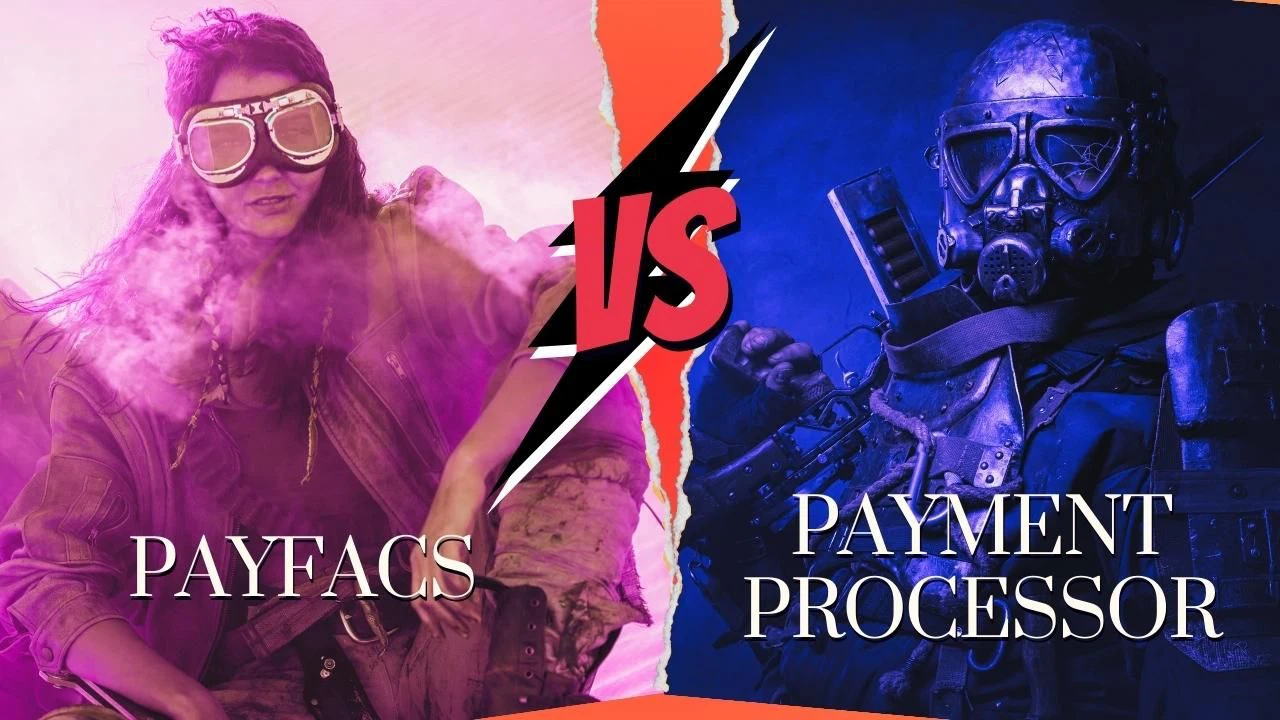
Did you know that high-risk businesses can experience a up to 30% increase in revenue by owning their own merchant accounts? We will show you how!
Payment processing is a game-changer for high-risk businesses like yours. TickleCharge experts can save your business endless headaches and business setbacks that come in the form of strict regulations to higher chargeback ratios and increased risk exposure.
The evidence is indisputable—owning your own high-risk merchant account delivers unparalleled revenue expansion and steadfast fiscal security. Let’s dive into the critical distinctions between payfacs and payment processors and discover why we believe owning a merchant account is essential for all kinds of high-risk businesses.
TickleCharge is here to guide you with its authoritative insights and strategies tailored specifically to your industry.
I. The Profitability Paradox: Unleashing the Power of Payment Processing
According to a study conducted by Forrester Consulting, companies that prioritize improving their payment processes can experience an average increase of 30% in their annual revenue. This staggering statistic underscores the immense potential for businesses to enhance their profitability by sharply focusing on their payment processing strategies.
In high-risk industries such as online gambling, adult entertainment, or nutraceuticals, a robust payment processing enables business owners to navigate the complex landscape while mitigating risks effectively. It allows for secure transactions, effective fraud prevention measures, and streamlined processes, ultimately safeguarding revenue streams and protecting the business from potential setbacks. These industries often face greater scrutiny from financial institutions and regulatory bodies due to their higher potential for chargebacks, fraud, or legal complications. Consequently, securing reliable and efficient payment processing solutions becomes paramount.
- Choosing the right solution: Payfac or Payment processor
When it comes to selecting the right payment processing solution, businesses must consider their specific needs and industry requirements. Two popular options worth exploring are Payment Facilitators (PayFacs) and traditional Payment Processors.
mPayFacs offer a comprehensive payment processing solution, handling everything from underwriting to merchant onboarding, transaction processing, and payouts. They provide a simplified experience, particularly for smaller businesses, by streamlining the payment process through a single, aggregated account. This approach offers convenience and faster onboarding but may come with limitations and less customization.
On the other hand, traditional Payment Processors offer more flexibility and customization options, catering to the unique needs of high-risk industries. They typically provide a wider range of integration options, advanced fraud detection tools, and dedicated customer support. This level of customization and control can be crucial for businesses in high-risk sectors, ensuring compliance and minimizing risk exposure.
Ultimately, businesses must carefully evaluate their specific requirements, risk tolerance, and growth plans to determine whether a PayFac or a traditional Payment Processor is the ideal fit for their payment processing needs.
With years of experience, a deep understanding of high-risk industries, and ability to provide all the ease of a Payfac as well as being a marketplace to connect with the best payment processor for your business – TickleCharge specializes in tailoring its payment stack for you.
TickleCharge offers a comprehensive suite of services, including robust fraud prevention measures, advanced chargeback management, and personalized payment processing solutions. By leveraging cutting-edge technology and industry expertise, TickleCharge empowers businesses to optimize their payment processes, reduce operational friction, and unlock the true potential of their revenue streams.
With TickleCharge as a strategic partner, businesses can focus on their core operations, confident in the knowledge that their payment processing needs are being handled efficiently and effectively, paving the way for increased profitability and long-term success.
II. Payfacs: The Revolution in Payment Processing
- Understanding the concept of payfacs and their unique feature
- Payfacs operate by aggregating merchants under a single master account, simplifying the onboarding process and providing a comprehensive payment solution. They offer unique features such as streamlined underwriting, integrated payment processing, and a user-friendly platform for merchants to accept payments efficiently.
- Advantages of using payfacs in high-risk industries
- Streamlined onboarding and simplified underwriting: Payfacs specialize in simplifying the onboarding process for high-risk industries. They typically have a streamlined application and underwriting process, allowing merchants to get approved and start accepting payments quickly. By reducing the administrative burden and minimizing paperwork, payfacs expedite the merchant onboarding process, enabling businesses to begin generating revenue faster.
- Risk-sharing and reduced financial exposure: High-risk industries often face greater exposure to chargebacks, fraud, and regulatory scrutiny. Payfacs assume a certain level of risk on behalf of their aggregated merchants, sharing the liability and providing protection against financial losses. This risk-sharing model helps alleviate the financial burden and potential losses that businesses in high-risk industries may face, offering a layer of security and peace of mind.
By partnering with TickleCharge, businesses in high-risk industries can tap into the expertise and guidance of industry specialists, ensuring they get the benefits of the payfac model while unlocking the power of owning their own high risk merchant account and owning the relationship with their processor.
III. Payment Processors: The Cornerstone of Secure Transactions

- Exploring the role of payment processors in high-risk industries
- Payment processors play a crucial role in high-risk industries by facilitating secure and seamless transactions. They act as intermediaries between merchants, customers, and financial institutions, ensuring that payments are processed efficiently while adhering to strict security and compliance standards. In high-risk industries such as online gambling or adult entertainment, where fraud and chargebacks are more prevalent, payment processors play an essential role in safeguarding transactions and maintaining business integrity.
- Key features and benefits of using payment processors
- Enhanced security measures and fraud prevention: Payment processors employ advanced security protocols to protect sensitive customer data and prevent fraudulent activities. They implement robust fraud detection systems, encryption technologies, and PCI DSS compliance measures to safeguard transactions and reduce the risk of fraud. By utilizing payment processors, businesses in high-risk industries can provide customers with peace of mind and maintain a secure payment environment.
- Customizable payment solutions and integrations: Payment processors offer customizable payment solutions tailored to the specific needs of businesses. They provide a range of payment options, including credit cards, e-wallets, and alternative payment methods, allowing merchants to cater to diverse customer preferences. Additionally, payment processors offer seamless integrations with various platforms, shopping carts, and software, enabling businesses to streamline their operations and provide a seamless checkout experience.
- Expert advice on selecting the right payment processor for your business
When choosing a payment processor, it is crucial to consider several factors. TickleCharge’s experts recommend the following:
- Industry expertise: Select a payment processor with experience in high-risk industries, as they possess a better understanding of the unique challenges and requirements specific to your business.
- Security and compliance: Ensure that the payment processor adheres to stringent security standards, such as PCI DSS compliance, to protect customer data and maintain a secure payment environment.
- Customization and integration options: Look for a payment processor that offers customizable payment solutions and seamless integrations with your existing systems, enabling you to tailor the payment experience to your specific business needs.
- Support and customer service: Assess the level of customer support provided by the payment processor. Prompt and reliable customer service is crucial in resolving any issues or concerns that may arise during payment processing.
By carefully considering these factors and seeking expert advice, businesses can select a payment processor that aligns with their unique requirements, enhances security, and maximizes profitability. TickleCharge’s specialists can provide valuable insights and guidance in selecting the right payment processor for your business, ensuring a smooth and secure payment processing experience.
IV. The Showdown: Payfacs vs. Payment Processors
- Head-to-head comparison of payfacs and payment processors
- Payfacs and payment processors are two distinct approaches to payment processing, each with its own set of features and advantages.
- Payfacs, or Payment Facilitators, offer a simplified onboarding process by aggregating merchants under a single master account. They provide an end-to-end solution that includes underwriting, transaction processing, and customer support.
- Payment processors, on the other hand, act as intermediaries between merchants, customers, and financial institutions, facilitating secure transactions and ensuring compliance.
- Evaluating factors such as fees, risk management, scalability, and customer experience
- When evaluating payfacs and payment processors, several factors should be considered:
- Fees: Payfacs typically charge a flat rate or percentage fee per transaction, simplifying the pricing structure. Payment processors may have more complex fee structures, including interchange fees and other transaction-related costs.
- Risk Management: Payfacs specialize in high-risk industries and often provide risk-sharing, assuming liability for chargebacks and fraud. Payment processors may offer robust fraud prevention tools but may not share the same level of risk.
- Scalability: Payfacs offer scalability by allowing merchants to easily onboard new merchants and expand their operations. Payment processors also offer scalability, but may require individual merchant accounts for each new merchant, which can be more complex to manage.
- Customer Experience: Payfacs provide a streamlined and user-friendly experience for both merchants and customers. Payment processors also aim to provide a seamless payment experience but may vary in terms of integrations and customization options.
- To illustrate the pros and cons of each option, let’s consider two examples:
- Example 1: A high-risk e-commerce business opts for a payfac. The payfac’s streamlined onboarding process enables the business to quickly start accepting payments. The risk-sharing model provides financial protection against chargebacks and fraud. However, if the business experiences rapid growth and needs to onboard a large number of merchants, the payfac may face scalability challenges.
- Example 2: A medium-sized online retailer chooses a payment processor. The retailer benefits from customizable payment solutions and seamless integrations, offering a tailored checkout experience. However, the retailer may need to manage individual merchant accounts and handle chargebacks and fraud prevention independently.
- When evaluating payfacs and payment processors, several factors should be considered:
- TickleCharge’s expert recommendations for making the optimal choice
- The best way to choose between a payfac and a payment processor is to consider your specific needs and requirements. If you are looking for a simple, affordable, and secure payment processing solution, a payfac is a good option. If you are looking for a more robust solution with a wider range of features, a payment processor may be a better choice.
- Here are some additional factors to consider when making your decision:
- Your processing volume: If you have a high processing volume, you may need a payment processor that can handle the increased load.
- Your industry: Some industries, such as healthcare and financial services, have more stringent compliance requirements. If you operate in one of these industries, you will need to make sure that your payment processing solution is compliant with all applicable regulations.
- Your budget: Payment processing fees can vary widely. Make sure to compare the fees of different providers before making a decision
- Once you have considered all of these factors, you will be able to choose the payment solution that is right for your business.
V. Conclusion
With our deep understanding of payfacs and payment processors, we help you make informed decisions that align with your business goals. Whether it’s streamlining onboarding, reducing financial exposure, or customizing payment solutions, TickleCharge is committed to empowering your business and driving profitability.
Contact us today for a consultation and gain the competitive edge you deserve!



